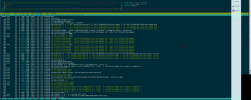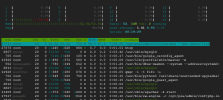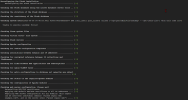Username:
TITLE
usermng
PRODUCT, VERSION, OPERATING SYSTEM, ARCHITECTURE
Debian 11, Bullseye, Plesk Obsidian Web Host Edition
Version 18.0.54 Update #2
PROBLEM DESCRIPTION
On a brand new Plesk installation on Google Cloud,
While doing
plesk repair all -y
The process gets stuck most of the times like below:
After a while we either get:
Or the system freezes completely and you have to restart the server.
I realized that when you run
the process never gets finished and the system slowly starts eating all the ram.
Till the system crashes.
I tried this on multiple installations.
I tried this with and without swap.
They all end up being the same.
This is from syslog:
I increased the memory of my machines. It didn't work.
I even created a new VM and tested this. It didn't work.
This happens even if Plesk has 1 or 0 users. So it's not like I have 1000000 users either.
Lastly,
I tried this on fresh Debian 11 and Debian 10 installations on Google Cloud, with 64GB ram.
Right after installing debian, I installed Plesk and ran the command.
Same thing on both instances.
It used all of the available ram without producing anything.


STEPS TO REPRODUCE
Just run:
/opt/psa/admin/bin/usermng --get-users-list
ACTUAL RESULT
System hangs
EXPECTED RESULT
Getting an instant list of users.
ANY ADDITIONAL INFORMATION
This is NOT the Google Cloud image.
This is a fresh Debian 11, Bullseye installation.
I've installed Plesk via:
sh <(curl https://autoinstall.plesk.com/plesk-installer || wget -O - https://autoinstall.plesk.com/plesk-installer)
Here
Now, I'm scared to move my servers till there is a fix for this.
I don't want to wake up to a billion problems due to system trying to fix things and crashing itself.
YOUR EXPECTATIONS FROM PLESK SERVICE TEAM
Help with sorting out
TITLE
usermng
PRODUCT, VERSION, OPERATING SYSTEM, ARCHITECTURE
Debian 11, Bullseye, Plesk Obsidian Web Host Edition
Version 18.0.54 Update #2
PROBLEM DESCRIPTION
On a brand new Plesk installation on Google Cloud,
While doing
plesk repair all -y
The process gets stuck most of the times like below:
Reconfiguring the Plesk installation
Reconfiguring the Plesk installation ............................ [OK]
Checking the Plesk database using the native database server tools .. [OK]
Checking the structure of the Plesk database ........................ [OK]
Checking the consistency of the Plesk database ...................... [OK]
Checking system users
After a while we either get:
Checking system users ERR [util_exec] proc_close() failed ['/opt/psa/admin/bin/usermng' '--get-users-list'] with exit code [137]
Or the system freezes completely and you have to restart the server.
I realized that when you run
/opt/psa/admin/bin/usermng --get-users-list
the process never gets finished and the system slowly starts eating all the ram.
Till the system crashes.
I tried this on multiple installations.
I tried this with and without swap.
They all end up being the same.
This is from syslog:
kernel: [ 271.459950] usermng invoked oom-killer: gfp_mask=0x100cca(GFP_HIGHUSER_MOVABLE), order=0, oom_score_adj=0
kernel: [ 271.470897] CPU: 2 PID: 45630 Comm: usermng Not tainted 5.10.0-23-cloud-amd64 #1 Debian 5.10.179-3
kernel: [ 272.757602] [ 45630] 0 45630 1675289 1662925 13418496 0 0 usermng
kernel: [ 272.786826] oom-kill:constraint=CONSTRAINT_NONE,nodemask=(null),cpuset=/,mems_allowed=0,global_oom,task_memcg=/user.slice/user-1000.slice/session-3.scope,task=usermng,pid=45630,uid=0
kernel: [ 272.804582] Out of memory: Killed process 45630 (usermng) total-vm:6701156kB, anon-rss:6651700kB, file-rss:0kB, shmem-rss:0kB, UID:0 pgtables:13104kB oom_score_adj:0
I increased the memory of my machines. It didn't work.
I even created a new VM and tested this. It didn't work.
This happens even if Plesk has 1 or 0 users. So it's not like I have 1000000 users either.
Lastly,
I tried this on fresh Debian 11 and Debian 10 installations on Google Cloud, with 64GB ram.
Right after installing debian, I installed Plesk and ran the command.
Same thing on both instances.
It used all of the available ram without producing anything.


STEPS TO REPRODUCE
Just run:
/opt/psa/admin/bin/usermng --get-users-list
ACTUAL RESULT
System hangs
EXPECTED RESULT
Getting an instant list of users.
ANY ADDITIONAL INFORMATION
This is NOT the Google Cloud image.
This is a fresh Debian 11, Bullseye installation.
I've installed Plesk via:
sh <(curl https://autoinstall.plesk.com/plesk-installer || wget -O - https://autoinstall.plesk.com/plesk-installer)
Code:
1. [*] Plesk
2. [*] BIND DNS server
3. [ ] PostgreSQL server
4. [ ] Fail2Ban
5. [*] All language localization for Plesk
6. [*] Git
7. [ ] Resource Controller (Cgroups)
8. [*] Plesk Migrator
9. [ ] Web Presence Builder
10. [*] MySQL server
11. [.] <+> Webmail services // 1 of 2 components selected
12. [.] <+> Mail hosting // 2 of 6 components selected
13. [.] <+> Web hosting // 8 of 19 components selected
14. [.] <+> Plesk extensions // 8 of 15 components selectedHere
Code:
Primary components list / extensions
===============================================================================
Select the components you want to install:
1. [*] Plesk Web Server Configuration Troubleshooter
2. [ ] Plesk Firewall
3. [ ] Watchdog system monitoring
4. [ ] WP Toolkit
5. [ ] Advisor
6. [ ] SEO Toolkit
7. [ ] ImunifyAV
8. [*] SSL It!
9. [*] Let's Encrypt
10. [*] Repair Kit
11. [*] PHP Composer
12. [*] Monitoring
13. [*] Log Browser
14. [ ] SSH Terminal
15. [*] Site ImportNow, I'm scared to move my servers till there is a fix for this.
I don't want to wake up to a billion problems due to system trying to fix things and crashing itself.
YOUR EXPECTATIONS FROM PLESK SERVICE TEAM
Help with sorting out


